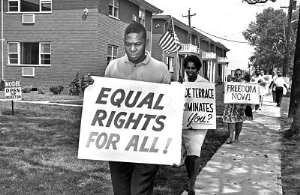
The state of human rights protection in Africa, 30 years after the creation of the African Commission on Human and Peoples' Rights, was the main highlight of the recent 61st session of the Commission in Banjul.
For Gambians, the fact that the Commission has been based in their country since its inception in 1987 was an irony, given that for 22 of those years they were under President Yahya Jammeh who is now being accused of human rights violations.
The country's new leader, President Adama Barrow, told a special gathering of various human rights stakeholders: '… the people of The Gambia recognise the commitment and support of the African Commission in ensuring that human rights are protected in The Gambia despite the uncooperative attitude of the former government.
'The Commission never shied away from carrying out its mandate even when it seemed impossible to do so in The Gambia, and for this we will remain eternally grateful.'
A statement on behalf of participants at the celebrations noted that serious restrictions on freedom of expression and information 'still abounds' in Africa.
It added: 'The existence of draconian laws curtailing the enjoyment of rights of citizens, censorship and cyber laws institutionalising internet restrictions and blockages remain disconcerting...
'The African Commission is urged to call on states to remove or amend laws that are not in compliance with protection guaranteed in national constitutions and under regional and international law...'
One participant told the GNA that there was particular concern about Mauritania, which is to host the 62nd session of the Commission in either April or May next year.
She pointed to the recent release from prison of Mauritanian blogger Mohamed Cheikh Ould Mkhaitir who had initially been sentenced to death.
On appeal, this was reduced to two years in prison and a fine, but having already served nearly four years he was released.
The Amnesty International welcomed the new ruling and called on the Mauritanian authorities to ensure that Ould Mkhaitir lived without threats from conservative religious circles.
Human rights activists said his arrest highlighted the lack of freedom of expression in Mauritania, and also underscored the heightened state of social and ethnic divisions in a country that is also going to host the African Union summit in June 2018.
The activists are critical of the apparent lack of substantial action by the government of President Mohamed Ould Abdel Aziz against slavery even though a law has been passed to ban the practice.
One activist told the GNA: 'Passing laws without properly implementing them is clearly not the right way to deal with a contentious issue such as slavery, particularly in the light of what President Barrow said at the celebratory meeting.'
In his address, the Gambian leader noted: '…it is important to note that human rights protection must not only be about enacting laws on paper.
'Concrete steps must be taken through the creation of institutions, policies and programmes for the full realisation and enjoyment of these rights.'
The main objective of the commemoration was to assess the impact of the Commission's work since its inception; raise awareness of its mandate; highlight its achievements and challenges; assess its prospects; and propose ways of moving the human rights agenda forward.
Some human rights activists believe that the achievements of the Commissions have been mixed.
In a message delivered on his behalf, the Chairperson of the African Union Commission, Moussa Faki Mahamat, told the Banjul gathering: 'Time has come for the African continent to resolutely overcome decades of numerous human rights challenges resulting from a diverse range of factors, including war, poverty, corruption, autocratic rule and exclusion of women from all spheres of life.
'I call also on member states to cooperate with all the organs and other relevant bodies to ensure that human rights and dignity are fully reinforced across the continent.'
In Mauritania, President Ould Azziz's opponents have accused him of the anti-constitutional and anti-democratic policies.
Human rights activists say that as the country prepares to host the Commission and AU, they will focus their spotlight on the government of President Ould Azziz and use the international focus on Mauritania over the next year to champion the cause of human rights in the country.
'With Mauritania also attempting to return to the Economic Community of West African States, (ECOWAS), which takes a robust stance against the violation of human rights and democratic principles, it is not going to be easy for President Ould Azziz to get his way.'




 We’ll no longer tolerate your empty, unwarranted attacks – TUC blasts Prof Adei
We’ll no longer tolerate your empty, unwarranted attacks – TUC blasts Prof Adei
 Bawumia donates GHc200,000 to support Madina fire victims
Bawumia donates GHc200,000 to support Madina fire victims
 IMF to disburse US$360million third tranche to Ghana without creditors MoU
IMF to disburse US$360million third tranche to Ghana without creditors MoU
 Truck owner share insights into train collision incident
Truck owner share insights into train collision incident
 Paramount chief of Bassare Traditional Area passes on
Paramount chief of Bassare Traditional Area passes on
 Two teachers in court over alleged illegal possession of BECE papers
Two teachers in court over alleged illegal possession of BECE papers
 Sunyani: Victim allegedly shot by traditional warriors appeals for justice
Sunyani: Victim allegedly shot by traditional warriors appeals for justice
 Mahama vows to scrap teacher licensure exams, review Free SHS policy
Mahama vows to scrap teacher licensure exams, review Free SHS policy
 Government will replace burnt Madina shops with a new three-story, 120-store fac...
Government will replace burnt Madina shops with a new three-story, 120-store fac...
